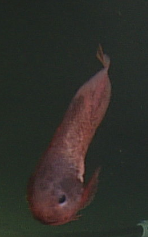Several species of bony fish have been documented at coastal sites. These bony fish were documented at Southern Hydrate Ridge, Slope Base, and the 600m Oregon Offshore site. Scroll down to learn more about several of these fish.
Return to the Coastal Biology home page.
Deep-Sea Sole (Embassichthys bathybius)

The Deep-Sea Sole is a bathydemersal flatfish. It lives along the sea floor and has both its eyes on one side allowing for it to look above for predators as it searches along the bottom for food. They are usually brown with a white speckled pattern, but juvenile Deep-Sea Sole have a blue tint. They can grow up to 47 cm in length. The Deep-Sea Sole is found in depths from 40 m to 1800 m but is most often found at 500 m to 950 m. This Sole was found at Hydrate Ridge at about 780 m along the sediment.
References:
Marine Life Field Guide (Neptune Canada)
http://pubs.usgs.gov/circ/c1198/chapters/185-191_ContinentalSlope.pdf
Dover Sole (Microstomus pacificus)

The Dover Sole is a Pacific flatfish of the flounder family which ranges from Baja California to the Bering Sea. It can live for over 50 years and grow up to 76 cm in length. They are brown or grayish brown in color, and spawn annually in the winter season in deep waters. Males begin to spawn at age four and females spawn at age five. It is commercially fished and is characterized by a light taste. This Sole was seen at Hydrate Ridge at a depth of 769 m. It was laying along the seafloor in cobbly sediment.
References:
Marine Life Field Guide, Neptune Canada
http://wdfw.wa.gov/fishing/bottomfish/identification/flatfish/m_pacificus.html
Weird Fish (Genioliparis ferox)

Photo Credit: NSF-OOI/UW/CSSF; Dive R1757; V14
The Genioliparis ferox is an extremely rare fish, having only been sighted four times, and filmed twice since the Visions’ 14 cruise. It was dubbed the “weird fish” by the Visions’ 14 science party upon its sighting. The weird fish lives in Northeastern Pacific Ocean deep waters. Little is known about the fish and its habits other than that it is a ferocious predator. It is about 35 cm in size, but due to lack of previous sightings we are unable to determine if that is the average size of the fish or not. It was found at 2901 water depth, swimming above the sediment at Slope Base.
Reference: https://www.calacademy.org/sites/default/files/assets/docs/liparidae.pdf
Eelpout (Licenchelys sp.)

The eelpout is similar in appearance to an eel with long slender bodies and their dorsal and anal fins connected to their caudal fin. They are benthic ray-finned fish. Eelpout have the ability to lay eggs as well as have live births. Eelpouts have been spotted at Southern Hydrate Ridge and around the FLOBN-MOS1 site at about 775 m below the sea surface. Species of eelpout can be up to 90 cm in length, however, the size specific to this species is unknown.
References:
www.britannica.com/EBchecked/topic/179928/eelpout
Marine Life Field Guide (Neptune Canada)
Sablefish (Anoploma fimbria)

Sablefish are grey in color with two dorsal fins and a broad round head. They are common throughout the North Pacific and are commercially important to the Japanese fishing industry. Sablefish range from 30 cm to 61 cm in length. They can live up to 90 years with one fish having been documented living 94 years. They are opportunistic feeders and prey on other fish, squid, jellies, and euphasiids. Multiple sablefish were seen along the seafloor at 580 m down at the Oregon Off Shore site. They are often found in deep sea areas with muddy seabeds.
References: Marine Life Field Guide (Neptune Canada)
http://wdfw.wa.gov/fishing/bottomfish/identification/other/a_fimbria.html
http://www.fao.org/fishery/species/3341/en
Red Snailfish (Elassodisus sp.)

Snailfish are scaleless with thin, loose gelatinous skin. Their pectoral fins are large and provide for means of locomotion. Snailfish can range between 5 cm to 77 cm in length. They are benthic fish and their diet consists of small invertebrates such as benthic crustaceans, mollusks, and polychaete worms. Some species are also believed to prey on smaller fish. This snailfish was seen at Southern Hydrate Ridge at a depth of about 600 m.
Reference:
https://www.britannica.com/animal/snailfish
